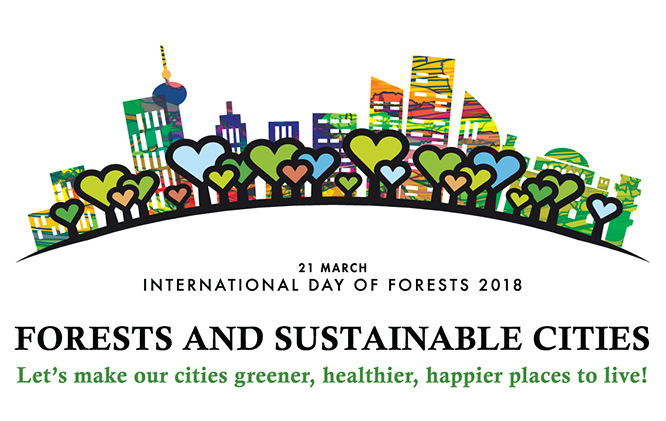OECS Commission observes International Day of Forests
OECS Media Release
The OECS Commission joins the global community in support of International Day of Forests, under the theme "Forests and Sustainable Cities" with the main focus raising awareness of the forest and ways in which it makes cities healthier for current and future generations.
WHY CELEBRATE INTERNATIONAL DAY OF FORESTS?
- Forests and trees store carbon, which helps mitigate the impacts of climate change in and around urban areas.
- Trees also improve the local climate, helping to save energy used for heating by 20-50 percent.
- Strategic placement of trees in urban areas can cool the air by up to 8 degrees Celsius, reducing air conditioning needs by 30 percent.
- Urban trees are excellent air filters, removing harmful pollutants in the air and fine particulates.
- Trees reduce noise pollution, as they shield homes from nearby roads and industrial areas.
- Local populations use the fruits, nuts, leaves and insects found in urban trees to produce food and medicines for use in the home, or as a source of income.
- Wood fuel sourced from urban trees and planted forests on the outskirts of cities provides renewable energy for cooking and heating, which reduces pressures on natural forests and our reliance on fossil fuels.
- Forests in and around urban areas help to filter and regulate water, contributing to high-quality freshwater supplies for hundreds of millions of people. Forests also protect watersheds and prevent flooding as they store water in their branches and soil.
- Well-managed forests and trees in and around cities provide habitats, food and protection for many plants and animals, helping to maintain and increase biodiversity.
- Forests in cities and surrounding areas generate tourism, create tens of thousands of jobs and encourage city beautification schemes, building dynamic, energetic and prosperous green economies.
- Urban green spaces, including forests, encourage active and healthy lifestyles, improve mental health, prevent disease, and provide a place for people to socialize.
March 21 was declared as the International Day of Forests by the United Nations General Assembly (UNGA) resolution A/RES/67/200 adopted on 21 December 2012. The resolution requests the Secretariat of the United Nations Forum on Forests, in collaboration with the Food and Agriculture Organization (FAO), to facilitate the implementation of the International Day of Forests, in collaboration with Governments and the Collaborative Partnership on Forests in addition to international, regional and sub-regional organisations and processes as well as relevant major groups. The resolution further encourages all UN Member States to organise activities relating to forests such as tree-planting, art, photo, film and other social media outreach.
Forests are the most biologically-diverse ecosystems on land and home to more than 80% of the terrestrial species of animals, plants and insects. Additionally, about 1.6 billion people around the world depend on forests for their livelihoods, medicines, fuel, food and shelter.
The theme for 2018 is Forests and Sustainable Cities and is aimed at raising awareness of the importance of forests and celebrating the ways in which they sustain and protect us. Forests cover one third of the earth’s land mass and are a critical ecosystem that performs vital functions for life on the planet such as water purification, providing raw materials, carbon sequestration and even cultural, spiritual, recreational and therapeutic services.
Despite these life-preserving benefits, deforestation around the globe continues to occur at an alarming rate—13 million hectares of forest are destroyed annually, also accounting for 12 to 20 percent of the global greenhouse gas emissions (GHGs) that contribute to climate change. The sustainable management of forests is therefore critical to countries around the world and for the benefit of current and future generations


